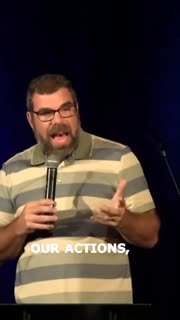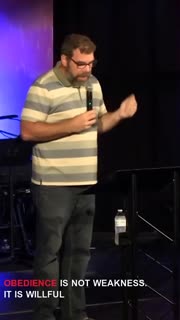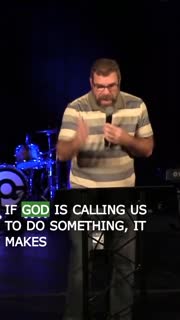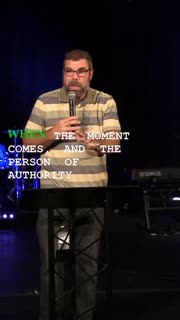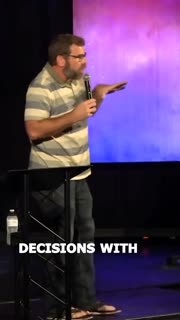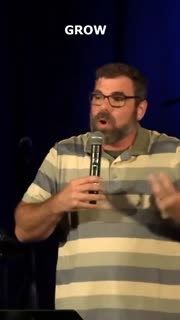Embracing Obedience: Trusting God's Authority and Purpose
Devotional
Sermon Summary
Bible Study Guide
Sermon Clips
### Quotes for Outreach
1. "When we align our actions, our will, to the boss, in whatever circumstance it may be, we now have the power, of the boss, to accomplish the task at hand. Think about it. Think about it at work. If your boss asks you to go do a certain project, and you're in that project, and you're having a problem, you go to him, hey, I'm struggling with this. He's going to, what do you need? What resources do you need? Let me help you get the project done that I, but if the boss gives you a project, and you're like, yeah, this is kind of dumb. I think we should really be doing this. And then you go to your boss, and you're like, yeah, I know that, but I'm doing this. He's not going to give you the funds. And the man, like, what are you doing?" [34:12] (42 seconds)
2. "Obedience is not weakness. It is willful alignment with someone more powerful. Let me say that again. It's not weakness. It's willful alignment to someone more powerful than ourselves. And we've talked about drill sergeants and parents and bosses at work. When we're talking about God, is there any more powerful? When we follow what God has asked us to do, we have universe-creating power and authority behind us. To accomplish whatever it is that God is asking us to do." [35:30] (37 seconds)
3. "Trust in the Lord with all your heart and lean not on your own understanding. And verse 6, in all your ways, submit to the Lord. Submit to him and he will make your path straight. In this one just beautiful set of verses from Solomon, who was given godly wisdom. We see just this process of what it means to be obedient to God's will. Trust in the Lord. It starts with trust. I believe he has my best interests in mind and he's the boss. Trust in him with part of my heart. No, all of my heart." [37:07] (36 seconds)
4. "We must obey God rather than man. I guarantee when God is calling you to do something, there is going to be not just resistance from yourself. Why are you talking to me? There's going to be resistance from other people from the world. That's going to come at you and be like, that doesn't make sense. That's not a good idea. Why are you doing that? Here's what you should do. And said, oh, everyone will have lots of good ideas for us of what we should do rather than the thing that God himself is calling us to do." [45:04] (32 seconds)
5. "If God is calling us to do something, it makes most sense to follow what he's calling, use his power and authority to do that. What we're going to do here now for the rest of our time together mostly is, is we, and again, we could share so many stories from the Bible of people who, but, but let's, let's bring, let's make this a little bit more real today. We have some, some people right from our own church who want to share their experiences of saying yes to God and what that looked like." [46:23] (27 seconds)
### Quotes for Members
1. "When the moment comes, and the person of authority is the person under them to listen and obey, especially if it's important or immediate, there's a reason. They need to be able to, yes, sir. Yes, mom. Yes, boss. Right? It's important that we learn to follow those under authority. And ultimately, what it comes down to, when you boil all of it down, the whole obedience issue, it's an issue of trust. It's an issue of trust. Do I trust that person who's in authority over me? Do I trust that person who's in authority over me? Do I trust them so that when they say to jump, I'm just saying the how high, right?" [32:50] (41 seconds)
2. "When we align our actions, our will, our decisions with whoever's sending us in that direction, we have their authority. We have their power to accomplish what they ask us to do. Right? And in doing so, we tend to think of obedience as like submission. It's weakness. This is very important. We need to understand this, because if we understand it, there's power. Obedience is not weakness. Obedience is not weakness. It is willful alignment with someone more powerful." [35:30] (32 seconds)
3. "So many times people are like, how do, well, you, yeah, you're talking about God's calling and how do I know? I'm not hearing that audible voice. What you just said right there is you prayed about it. And the things, the things were on the table and you put them on the table. You like laid them at God's feet. If metaphorically, if I'm, don't let me put words in your mouth and you prayed about it. And this one you had peace with. Yeah. I believe it sounds like you do too, that that is for many of us, the process to hear God's voice, to hear from him, the thing that you're, I don't, should I do this?" [48:44] (32 seconds)
4. "We are going to grow as a person in whatever way we need to through that obedience and accomplish some, I should say, and, or, and, or accomplish some purpose that he has when we say that. Yes. So let's quickly look at an example from the Bible. And there's many examples in the Bible of disobedience. Jonah comes to mind who like, ran from God and ended up in a whale. Don't do that. So many stories of obedience. We could talk about Abraham. We could talk about Moses, Daniel, Mary, Jesus's mom. I am the handmaid of the Lord. Do as you will. And of course, Jesus, the ultimate example of obedience." [41:02] (39 seconds)
5. "Peter's very first time he met Jesus, he experienced Jesus. Uh, and we can, you can read about it in Luke chapter five, um, which ironically Luke wrote Acts. So in chapter five of Luke that Luke wrote, you, Peter meets Jesus and in Acts five, he's filled with the Holy Spirit. It's amazing. I love the Luke five. We read the story of, of Peter fishermen with his brother, Andrew, their buddies, James and Don, these guys, they've been working all night. Haven't caught any fish. They're cleaning their nets. And this guy comes along. This is like preacher unknown. And he's just sitting there and crowds are following him, pressing in on him. Jesus sees an opportunity." [15:44] (41 seconds)
Ask a question about this sermon
1. "When we align our actions, our will, to the boss, in whatever circumstance it may be, we now have the power, of the boss, to accomplish the task at hand. Think about it. Think about it at work. If your boss asks you to go do a certain project, and you're in that project, and you're having a problem, you go to him, hey, I'm struggling with this. He's going to, what do you need? What resources do you need? Let me help you get the project done that I, but if the boss gives you a project, and you're like, yeah, this is kind of dumb. I think we should really be doing this. And then you go to your boss, and you're like, yeah, I know that, but I'm doing this. He's not going to give you the funds. And the man, like, what are you doing?" [34:12] (42 seconds)
2. "Obedience is not weakness. It is willful alignment with someone more powerful. Let me say that again. It's not weakness. It's willful alignment to someone more powerful than ourselves. And we've talked about drill sergeants and parents and bosses at work. When we're talking about God, is there any more powerful? When we follow what God has asked us to do, we have universe-creating power and authority behind us. To accomplish whatever it is that God is asking us to do." [35:30] (37 seconds)
3. "Trust in the Lord with all your heart and lean not on your own understanding. And verse 6, in all your ways, submit to the Lord. Submit to him and he will make your path straight. In this one just beautiful set of verses from Solomon, who was given godly wisdom. We see just this process of what it means to be obedient to God's will. Trust in the Lord. It starts with trust. I believe he has my best interests in mind and he's the boss. Trust in him with part of my heart. No, all of my heart." [37:07] (36 seconds)
4. "We must obey God rather than man. I guarantee when God is calling you to do something, there is going to be not just resistance from yourself. Why are you talking to me? There's going to be resistance from other people from the world. That's going to come at you and be like, that doesn't make sense. That's not a good idea. Why are you doing that? Here's what you should do. And said, oh, everyone will have lots of good ideas for us of what we should do rather than the thing that God himself is calling us to do." [45:04] (32 seconds)
5. "If God is calling us to do something, it makes most sense to follow what he's calling, use his power and authority to do that. What we're going to do here now for the rest of our time together mostly is, is we, and again, we could share so many stories from the Bible of people who, but, but let's, let's bring, let's make this a little bit more real today. We have some, some people right from our own church who want to share their experiences of saying yes to God and what that looked like." [46:23] (27 seconds)
### Quotes for Members
1. "When the moment comes, and the person of authority is the person under them to listen and obey, especially if it's important or immediate, there's a reason. They need to be able to, yes, sir. Yes, mom. Yes, boss. Right? It's important that we learn to follow those under authority. And ultimately, what it comes down to, when you boil all of it down, the whole obedience issue, it's an issue of trust. It's an issue of trust. Do I trust that person who's in authority over me? Do I trust that person who's in authority over me? Do I trust them so that when they say to jump, I'm just saying the how high, right?" [32:50] (41 seconds)
2. "When we align our actions, our will, our decisions with whoever's sending us in that direction, we have their authority. We have their power to accomplish what they ask us to do. Right? And in doing so, we tend to think of obedience as like submission. It's weakness. This is very important. We need to understand this, because if we understand it, there's power. Obedience is not weakness. Obedience is not weakness. It is willful alignment with someone more powerful." [35:30] (32 seconds)
3. "So many times people are like, how do, well, you, yeah, you're talking about God's calling and how do I know? I'm not hearing that audible voice. What you just said right there is you prayed about it. And the things, the things were on the table and you put them on the table. You like laid them at God's feet. If metaphorically, if I'm, don't let me put words in your mouth and you prayed about it. And this one you had peace with. Yeah. I believe it sounds like you do too, that that is for many of us, the process to hear God's voice, to hear from him, the thing that you're, I don't, should I do this?" [48:44] (32 seconds)
4. "We are going to grow as a person in whatever way we need to through that obedience and accomplish some, I should say, and, or, and, or accomplish some purpose that he has when we say that. Yes. So let's quickly look at an example from the Bible. And there's many examples in the Bible of disobedience. Jonah comes to mind who like, ran from God and ended up in a whale. Don't do that. So many stories of obedience. We could talk about Abraham. We could talk about Moses, Daniel, Mary, Jesus's mom. I am the handmaid of the Lord. Do as you will. And of course, Jesus, the ultimate example of obedience." [41:02] (39 seconds)
5. "Peter's very first time he met Jesus, he experienced Jesus. Uh, and we can, you can read about it in Luke chapter five, um, which ironically Luke wrote Acts. So in chapter five of Luke that Luke wrote, you, Peter meets Jesus and in Acts five, he's filled with the Holy Spirit. It's amazing. I love the Luke five. We read the story of, of Peter fishermen with his brother, Andrew, their buddies, James and Don, these guys, they've been working all night. Haven't caught any fish. They're cleaning their nets. And this guy comes along. This is like preacher unknown. And he's just sitting there and crowds are following him, pressing in on him. Jesus sees an opportunity." [15:44] (41 seconds)
